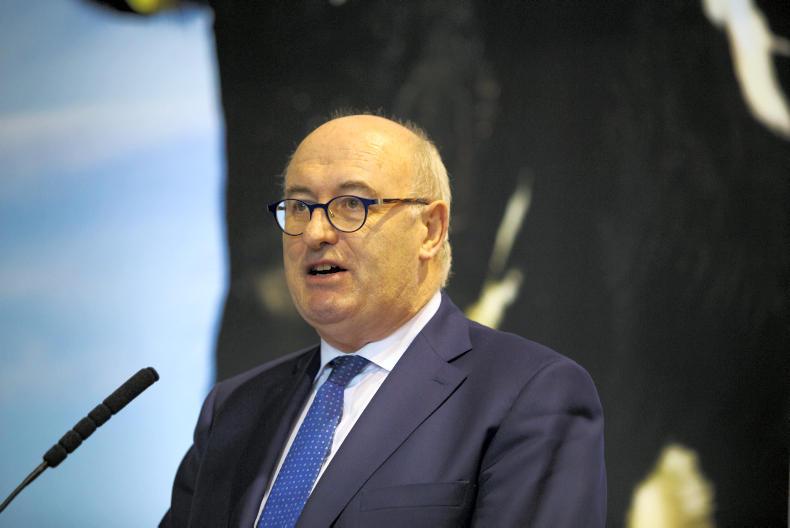1 The risk posed by Brexit to Ireland’s agri-food sector means it is more important than ever that the industry grows exports to non-EU destinations – European Commissioner for Agriculture Phil Hogan.
2 Is the UK government preparing to make British farmers and food standards the sacrificial lambs on the altar of trade for a global Britain? – European Commissioner for Agriculture Phil Hogan.
3 In light of the Brexit vote, the agri-food industry faces major challenges to reach the FoodWise 2025 target of €19bn in food and drink exports – Bord Bia chief executive Tara McCarthy.
4Ireland will continue to trade in the UK but has to defend its market position. The growth opportunities are going to come from international markets in the years ahead – Bord Bia chief executive Tara McCarthy.
5 Developing the Chinese market for Irish food, and beef in particular, was a slow process and long game. Ireland is on a much faster track to trade access than any other country in Europe – Aidan O’Driscoll, secretary general with the Department of Agriculture.
6 The upcoming negotiations between the UK and the EU are the most important set of trade talks since Ireland first negotiated its way into the EEC in 1973 – Aidan O’Driscoll, secretary general with the Department of Agriculture.
7 The UK leaving the EU customs union will add between 8% to 10% to the cost of business, which will ultimately be passed back down the chain in terms of poorer agricultural prices – Michael Haverty, economist with Anderson’s Consultants.
8 Trade agreements are as much about opening minds as they are about opening markets – Sir Lockwood Smith, New Zealand’s High Commissioner to the UK.
9 Farm subsidies are only eroding the competitiveness of farmers in Europe, as the focus is on subsidies and not on the realities of the market and how to be more competitive – Sir Lockwood Smith.
10 While Brexit had affected currency markets and created uncertainty, figures show that primary producers are getting just 21% of returns from beef markets, while retailers are taking over 50% of the returns. If global trade is to work for farmers a fairer slice of the market will have to be returned back through the chain – Joe Healy, IFA president.
Read more
Full coverage: Navigating Global Trade conference
1 The risk posed by Brexit to Ireland’s agri-food sector means it is more important than ever that the industry grows exports to non-EU destinations – European Commissioner for Agriculture Phil Hogan.
2 Is the UK government preparing to make British farmers and food standards the sacrificial lambs on the altar of trade for a global Britain? – European Commissioner for Agriculture Phil Hogan.
3 In light of the Brexit vote, the agri-food industry faces major challenges to reach the FoodWise 2025 target of €19bn in food and drink exports – Bord Bia chief executive Tara McCarthy.
4Ireland will continue to trade in the UK but has to defend its market position. The growth opportunities are going to come from international markets in the years ahead – Bord Bia chief executive Tara McCarthy.
5 Developing the Chinese market for Irish food, and beef in particular, was a slow process and long game. Ireland is on a much faster track to trade access than any other country in Europe – Aidan O’Driscoll, secretary general with the Department of Agriculture.
6 The upcoming negotiations between the UK and the EU are the most important set of trade talks since Ireland first negotiated its way into the EEC in 1973 – Aidan O’Driscoll, secretary general with the Department of Agriculture.
7 The UK leaving the EU customs union will add between 8% to 10% to the cost of business, which will ultimately be passed back down the chain in terms of poorer agricultural prices – Michael Haverty, economist with Anderson’s Consultants.
8 Trade agreements are as much about opening minds as they are about opening markets – Sir Lockwood Smith, New Zealand’s High Commissioner to the UK.
9 Farm subsidies are only eroding the competitiveness of farmers in Europe, as the focus is on subsidies and not on the realities of the market and how to be more competitive – Sir Lockwood Smith.
10 While Brexit had affected currency markets and created uncertainty, figures show that primary producers are getting just 21% of returns from beef markets, while retailers are taking over 50% of the returns. If global trade is to work for farmers a fairer slice of the market will have to be returned back through the chain – Joe Healy, IFA president.
Read more
Full coverage: Navigating Global Trade conference








SHARING OPTIONS